#rep writes
Text
Didn’t feel like waiting for April 2nd to post so here's a new chapter B)
18 notes
·
View notes
Text
Represention of Autistic Frustration in Laios Dungeon Meshi
Like many other autistic people, I related strongly to Laios Touden while reading Dungeon Meshi. This post isn't going to spend time disputing whether he displays autistic traits or not—while I could do that, I want to focus on why specifically his portrayal struck a chord with me in a way the writing of most other autistic-coded characters has not.
Disclaimer: as the above suggests, this post is strongly informed by my own experiences as an autistic person, as well as the experiences of my neurodivergent friends with whom I have spoken about this subject. I want to clarify that in no way am I asserting my personal experience to be some Universal Autistic Experience. This post is about why Laios' character feels distinct and significant to me in regard to autistic representation, and while I'm at it, I do feel that I have interesting things to say about autistic representation in media generally. This also got a bit long, so I'm sticking it under a read more. Spoilers for up to the end of chapter 88 below.
The thing that stands out most to me in regard to Laios' characterisation is the open anger he displays when someone points out his inability to read other people. This comes up prominently in his interactions with "Shuro" (Toshiro Nakamoto):
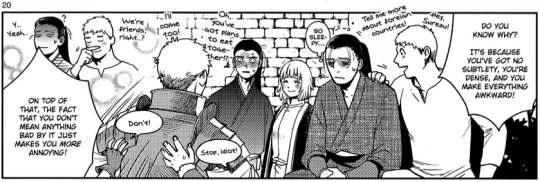
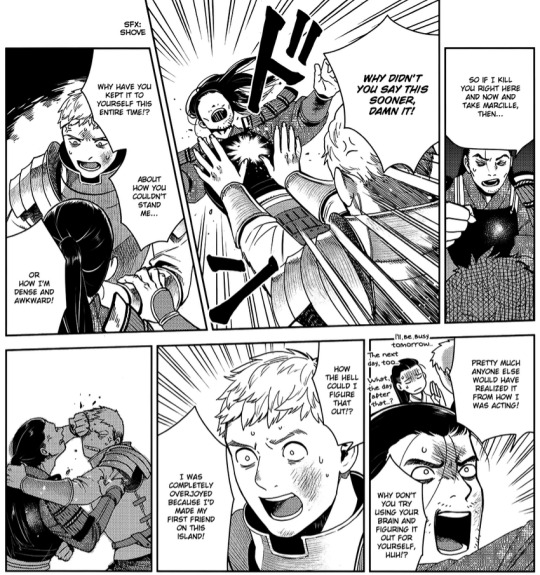
The frustration pictured above (Laios continuing to physically tussle with Toshiro, using crude language toward him) becomes even more notable when you remember that this is Laios, who, outside of these interactions, is not easily fazed and often exists as a lighthearted contrast to the rest of the cast. Then we get to Laios' nightmare.
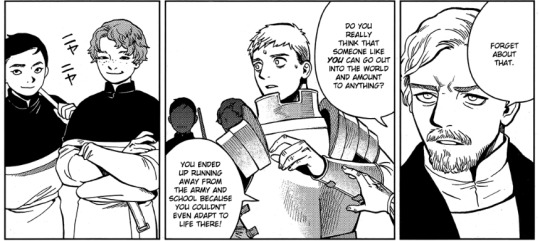

In Falin's words: "Nightmares love emotional wounds. Wounds you hold in your heart. Things that give you stress, or things that were traumatic for you. They aggravate memories like that and cause the dreamer to have terrible dreams." (chapter 42, page 10.) (damn. i'm properly citing for this post and everything.)
Thus, Laios' nightmare establishes an important fact: even if he is unable to recognise social blunders while he's making them, he's at least subconsciously aware that other people operate on a different wavelength to him, and that he's an outsider in many of his social circles (both past and present). His dream-father's disparaging words stress the impact this has had upon his ability to live up to the expectations set out for him, and we also get a panel of kids who smirk at him (presumably former bullies to some degree). Toshiro's appearance only hammers home how much Laios is still both humiliated and angered by his misunderstanding of their relationship.
I've thought a lot about anger as concomitant to the autistic experience. When autistic representation portrays ostracization, it's generally from an angle of the autistic character being upset at how conforming to neurotypical norms doesn't come easily to them; as a result, they express a desire to 'get better' at meeting neurotypical standards, a desire to become more 'normal' (whether the writing implies this is a good thing or not). In contrast, not once does Laios go, "I need to perform better in my social interactions, and try to care less about monsters, because that's what other people find weird." His frustration is directed outward rather than inward, and as a result, it's the people around him who are framed as nonsensical.
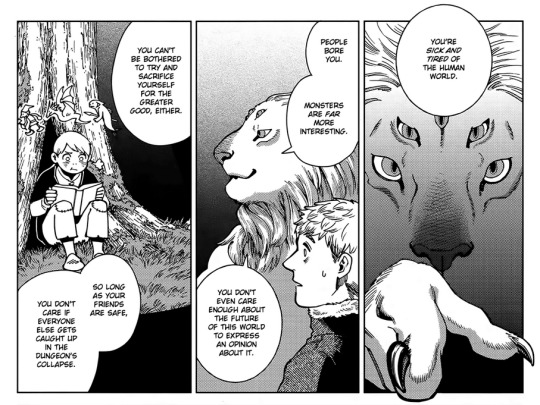
The Winged Lion starts delineating Laios' anger, and Laios' reaction is to think to himself, "It can sense all my thoughts, huh?" (chapter 88, page 16.) This is the scene that really resonated with me. I'm not saying I have never felt the desire to conform to neurotypical norms that is borne from insecurity, but primarily, I know that I don't want to work toward becoming 'normal'—I don't want to change myself for people who follow rules I find nonsensical. It's the difference between, "Oh god, why can't I get it," and, "WHY CAN'T YOU GET IT?" (phrasing here courtesy of my friend Miles @dogwoodbite). And for me personally, Dungeon Meshi is the first time I've seen this frustration and the resultant voluntary isolation from other people portrayed in media so candidly. Laios' anger is not downplayed or written to be easily palatable, either.
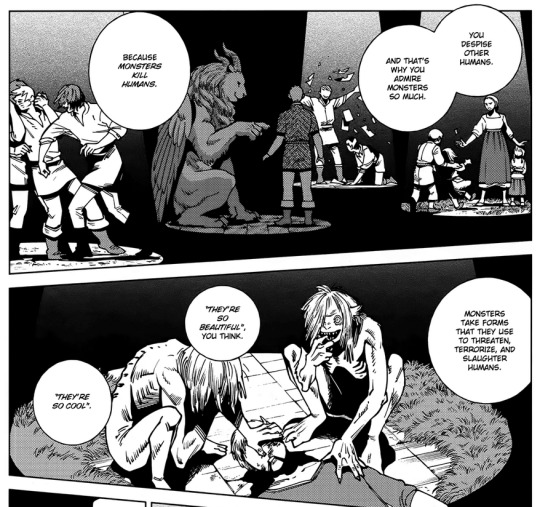
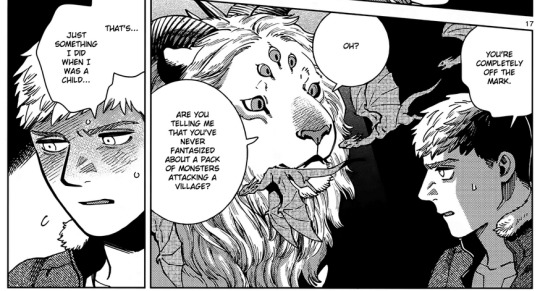
The culmination of Laios' frustrations in this scene wherein we learn that Laios has fantasised about "a pack of monsters attacking a village" drives home just how alienated he really feels. I need not go into his wish to become a monster himself, redolent of how many autistic people identify/have identified with non-humans to some degree as a result of a percieved disconnect from society (when I was younger, I wanted to be a robot. I still kind of do.)
Obviously, wishing death upon other people is a weighty thing, but the unfiltered nature of this page is what deeply resonated with me. The Winged Lion is laying Laios' deepest and most transgressive desires bare, and they are desires that are a product of lifelong ostracization by others (whether intentional or unintentional). This is the brand of anger I'm familiar with, and that my neurodivergent friends express being familiar with, but that I haven't seen portrayed in writing so explicitly before—in fact, it surprised me because most well-meaning autistic representation I've experienced veers toward infantilisation in trying make the autistic character's struggles easy for neurotypicals to sympathise with.
Let's also not neglect the symbolism inherent to Laios' daydream. "A pack of monsters attacking a village". Functionally, monsters are Laios' special interest—he percieves everything first and foremost through his passion for monsters. His daydream of monsters attacking—killing—humans, is fundamentally a daydream of the world he understands (monsters) overthrowing the world that is so illogical to him, that has repeatedly shunned him (other people). I joked to my friends that it's an autistic power fantasy, and it actually sort of is. And in it, his identity is aligned with that of the monsters, while his anger manifests in a palpable dissociation from the rest of humanity. This is one manga page. It's brief. It's also very, very raw to me. I think about it often.
To conclude, I love Laios Dungeon Meshi. This portrayal of open frustration in an autistic character meant a lot to me, and I hope I've sufficiently outlined why. Also, feel free to recommend media with autistic representation in the notes if you've read this far—I would really like to see if there is more of this nature. Thank you for reading. I'm very tired and should probably sleep now.
#dungeon meshi#dunmeshi#laios touden#shuro#toshiro nakamoto#the winged lion#autistic#autism#clay writes#i GUESS#this was so spur of the moment. im so busy right now i dont have time to be analysing laios touden#i wuont angry autistic rep..
8K notes
·
View notes
Text
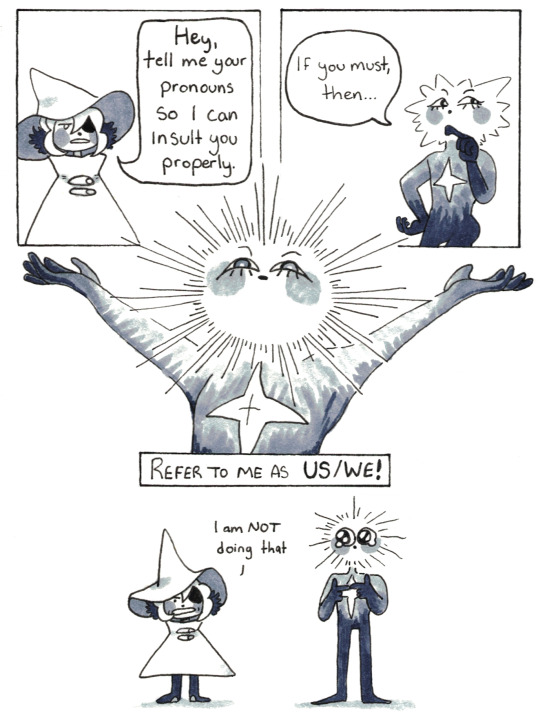
Reasons to play In Stars and Time: Canon Pronoun Warfare.
#in stars and time#ISAT#Siffrin#Loop#Context: early on you meet a character who tries to get you to use the royal We pronoun for them and you shut them down. It's great.#The gender swag and non-binary rep in this game is lovely.#I sketched this out when I was in Act 2 - and as of posting this I have not yet finished the game so *please* no spoilers.#It is rare for me to get into something spoiler free and I have been getting my shit rocked by this game in the best way.#Yes I *am* taking another detour to talk about a video game I love again. I will have some fun crossovers. Trust the process.#I will also do my best to pitch this game as spoiler free as possible. Because you *should* play this game:#ISAT is a very lovingly crafted RPG with very fun and emotional writing.#The characters are great and the mysteries you slowly uncover are intriguing!#The way the gameplay ties into the player's own emotional state is nearly always in sync with the protagonist. You *will* feel things.#And it is not afraid to let those things be hard emotions! Do mind the content warnings and know your limits though.#As someone who sucks at video games I also appreciate that it is so generous with your time and keeps things fun.#Not to mention it is honestly underpriced for the amount of content in it. Buy this game. I need to spread the brainworms.
738 notes
·
View notes
Text
maybe you aren't evolved enough to appreciate female characters who are terrible people but I am. Let women be annoying, self obsessed, entitled, and as much of an asshole as their male counterparts.
#i wrote this while thinking about the double standards community forces on Britta#and while writing it i thought of killing eve#and sweet dee reynolds from its always sunny#we need more terrible women rep#sweet dee#dee reynolds#iasip#killing eve#eve polastri#villanelle#britta perry#community
21K notes
·
View notes
Note
Do you intentionally write Zuko super autistic or does that just happen?
This is like asking if I'm intentionally self-diagnosing
#me: writes a relatable Zuko#readers: thanks for the autism rep!#me:#me: the what now#avatar the last airbender#atla#Zuko
1K notes
·
View notes
Text
actually there's a huge difference between queerbaiting/"Hey guys look how gay these two are haha they're definitely gonna end up together, give us views uwu oh- never mind oops they're going to superhell" and "Hey it's 2004-2012 and there's no way we can get away with having our protags/main couple be two gay men but we really want to show these two are soulmates so we'll do it through subtext and underlying messages and by literally telling you over and over again their relationship is the most stable and important in the entire show, and the ending will imply they lived and died together", and it's insane that some of yall don't see how these two are not the same fucking thing.
#saw a very Shit Take about hilson earlier and im like. hm. some of yall have no idea what gay rep was like before 2016ish and it shows!#i feel like usa queer ppl have forgotten that this is actually still the norm about queer rep in most non-USA places#or are young enough/new enough in fandom that they dont know this was actually the most we'd get at the time#like if it was queerbaiting it would eventually be played as a joke Haha No Homo#but it wasnt. like. their relationship was shown to be THE most stable and important one in both their lives & the show overall#they literally destroyed their LIVES to be with each other. repeatedly.#anyway i could write an entire 10 page thesis on the matter but i have an actual exam in three hrs so. another time#house md#hilson#greg house#james wilson#gregory house#house x wilson
2K notes
·
View notes
Text
Disability Tropes: The Miracle Cure
The miracle cure is a trope with a pretty negative reputation in disability circles, especially online. It describes a scenario in which, a disabled character, through either magic, advanced technology, divine intervention or some combination of the three, has their disability cured throughout the course of the story. Sometimes this is literally, as in the disability is completely and entirely cured with no strings attached. Other times, it looks like giving an amputee character a prosthetic so advanced that it's basically the same as "the real thing" and that they never take off or have any issue with, or giving the character with a spinal injury an implant that bypasses the physical spine's break, or connects to an exoskeleton that allows them to walk again. Sometimes, it can even look like giving a character some kind of magic item or power that negates the effects of the disability, like what I talked about in my post about "the super-crip" trope. Either way though, the effect is the same: The disability is functionally cured and is no longer an "issue" the author or character has to worry about.
But why would this be a bad thing? In a world with magic or super-advanced tech, if you can cure a character's disability, why wouldn't you?

[ID: a screenshot of Roy mustang from Full metal alchemist Brotherhood, a white man with short black hair in a hospital gown. In the corner of the screen is the hand of another person holding a small red gemstone. /End ID]
Well there's a few reasons. First, lets talk about the purely writing related ones.
If you've been around the writing or even media critique communities for a bit, you've likely heard people voicing their frustrations with tropes like "The fake-out death" where a character is either implied to have died, but comes back later, or is explicitly shown to be dead and then resurrected. Often when this happens in media, it leaves the audience feeling cheated and like a character's actions and choices don't really matter if even the worst mistakes and consequences can be undone. In the case of the latter situation, where they die and are brought back, it can make the stakes of the whole story feel a lot lower, since even something like death is shown to be reversible, so the audience doesn't really have to worry about anything bad happening to their favourite character, and once you've used this trope one time, people will constantly wonder why you wouldn't use it every time it comes up.
The same is true for "fixing" a character's disability. It sets a precedent that even things as big and life-changing as disability aren't permanent in this setting. We don't have to worry about anything major happening to the characters, there's no risks associated with their actions if it can all be undone, and it will lower the stakes of the story for your audience. Personally, I also feel like it's often used as a cop-out. Like writers wanted to include a major injury the leads to something big like disability for shock value, but weren't sure how to actually deal with it afterwards, so they just made it go away. Even in cases where the character start the story with a disability and are cured, this can still cause issues with your story's stakes, because again, once we've seen you do it once, we know its possible, so we won't feel the need to worry about anything being permanent.
Ok, so that's the purely writing related reasons, but what if that situation doesn't apply to the story you're writing? What if they're "fixed" right at the end, or the way they're cured is really rare, so it can't be used multiple times?
I'm glad you asked, because no, this is far from the only reason to avoid the trope! In my opinion, the more important reason to avoid it is because of how the a lot of the disabled community feels about the miracle cure trope, and the ideas about disability it can perpetuate if you're not very, very careful.
You might have noticed that throughout this post, I've put words like "cured" and "fixed" in quotes, and that's because not every disabled person wants a cure or feels like their ideal to strive for is able-bodied and neurotypical. For many of us, we have come to see our disabilities as part of us, as part of our identities and our sense of self, the same way I, as a queer person might see my queerness as a part of my identity. This is an especially common view among people who were born with their disability or who had them from a young age, since this is all they've ever really known, or who's disability impacts the way they think, perceive and process the world around them, how they communicate with people or in communities who have a long history of forced conformity and erasure such as the autism and deaf communities. Many disabilities have such massive impacts on our lives that we literally wouldn't be who we are today if they were taken away. So often though, when non-disabled people write disabled characters, they assume we'd all take a "cure" in a heart-beat. They assumed we all desire to be just like them again, and this simply isn't the case. Some people absolutely would, and there's nothing wrong with that, but it's not as universal as media representation makes it out to be.
Another reason it's so heavily disliked is because this trope is often used in conjunction with other ableist and harmful tropes or it's used in ways that perpetuate misinformation about living with a disability and it can have ableist implications, even if that's not what the author necessarily intended.
If the miracle cure is used right at the end of the story for example, as a way to give characters a happy ending it can imply that the only way for a disabled character to be happy in the long run, is for them to be "fixed", especially if they were miserable all the way up until that point. If it's used earlier in the story as a way to get said character back into the action, it can also be read as the author thinking that disabled people can't be of use to the plot, and so the only way to keep them around is to "fix" them.
Of course, there's also the fact that some authors and writers will also play up how bad being disabled is in order to show why a cure is justified, playing into the "sad disabled person" trope in the process, which is pretty much what it says on the tin. Don't get me wrong, this isn't to say that being disabled is all easy-breezy, there are never any hard days and you should never show your character struggling, not at all, the "sad disabled person" trope has it's place (even if I personally am not a fan on it), but when both the "sad disabled person" trope and the miracle cure trope are used together, it's not a great look.
This is especially bad when the very thing that cures the disability, or perhaps the quest the heroes need to go on to get it, is shown to be harmful to others or the disabled person themselves. Portraying living with a disability as something so bad that it justifies hurting others, putting others at risk, loosing yourself or killing yourself in order to achieve this cure perpetuates the already harmful idea that disability is a fate worse than death, and anything is justified to avoid it.
I've also noticed the reasons the authors and writers give for wanting to cure their characters are very frequently based on stereotypes, a lack of research in to the actual limits of a person's disability and a lack of understanding. One story I recall reading years ago made sure to tell you how miserable it's main character, a former cyclist, was because he'd been in a car accident where he'd lost his arm, and now couldn't ride bikes anymore, seemingly unaware of the fact arm amputees can, in fact, ride bikes. There are several whole sports centred around it, and even entire companies dedicated to making prosthetic hands specifically for riding bikes. but no, the only way for this to resolve and for him to be happy was to give him his arm back as a magical Christmas miracle! It would be one thing if the story had acknowledged that he'd tried cycling again but just had difficulties with it, or something was stopping him from being able to do it like not being able to wear the required prosthetic or something, but it really did seem as though the author was entirely unaware it was even possible, which is an issue when it's the whole point of your story existing. This happens a lot more often than you'd think, and it's very clear when an author hasn't even bothered to google search if their character would be able to do something before deciding the only solution is to take the disability away.
There's also the frustration that comes from being part of an underrepresented minority, finally seeing a character like you on screen or in a book, only for that representation to be taken away. Disabled people make up roughly 16% of the population (though many estimate these numbers are actually much higher), but only about 2.8% of American TV shows and 4.1% of Australian TV shows feature explicitly disabled characters. In 2019, around 2.3% of films featured disabled characters in a speaking roll, and while it's slowly getting better as time goes on, progress on that front is very slow, which is why its so frustrating when we do see characters like ourselves and so much of their stories focus on wishing to be, trying to become or actually being "cured".
An finally, there's the fact this is just a really common trope. Even if we ignore the issues it can cause with your story's tone and stakes, the harm it can do to the community when not handled with care, the negative perceptions it can perpetuate and everything else. It's just a plain-old overdone trope. It shows up so often that I, and a lot of disabled people, are just getting tired of seeing it. Despite everything I've said, there are valid reasons for people to not want to be disabled, and just like how I made sure to emphasise that not everyone wants a cure, it's important to recognise that not everyone would refuse it either. So long as it's not done in a way that implies it's universal, in theory, depicting someone who would want and accept a cure is totally fine. The issue is though that this trope is so common and so overdone that it's starting to feel like it's all we ever see, especially in genres like sci-fi and fantasy (and also Christmas movies for some reason).
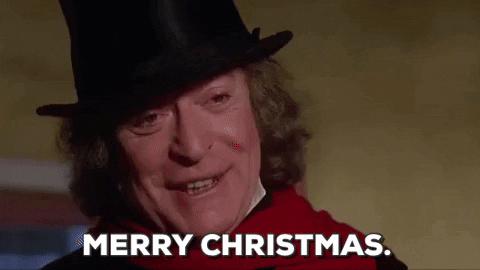
[ID: A Gif of a white man in a top hat nodding his head with the caption "Merry Christmas" down the bottom. /end ID]
Personally, because it's so common, I find even the few examples of the trope used well frustrating, and I honestly feel that it's at the point where it should be avoided entirely where possible.
Ok but Cy, you mentioned there are ways to use this trope well, what are they?
So, like I said, I'm of the opinion that this trope is better off not being in your work at all, but if, for whatever reason, you can't avoid it, or it's use is really that important to the story you want to tell, there are less harmful ways to implement it.
Don't have your only disabled character take the cure
If you really must cure your disabled character's disability, don't make them the only disabled person in the story. Show us another character who, when offered the same cure, chooses not to take it. This at least helps push back a little against the assumption of "of course everyone would want this" that these kinds of stories often imply and doesn't contribute (as much) to disability erasure in the media.
Don't make it a total cure
In real life, there are cures for some disabilities, but they rarely leave no trace. For example, an amputee's limb can sometimes be reattached if it was severed and they received medical treatment fast enough, but it usually results in at least a little nerve damage and difficulties with muscle strength, blood flow or co-ordination in that limb. Often times, these "cures" will fix one issue, but create another. You might not be an amputee anymore, but you're still disabled, just in a different way. You can reflect this in your fictional cures to avoid it feeling like you just wanted to avoid doing the work to write good disabled representation.
Do something interesting with it
I got a comment on my old tumblr or possibly Tik Tok account ages ago talking about their planned use for the miracle cure trope, where their character accepts the cure at the cost of the things that made her life enjoyable post-disability. Prior to accepting the cure, she had found other ways to be independent to some extent and her community and friends helped her bridge the gaps, but they were all taken from her when she was "cured" forcing her into isolation. Kind of like a "be careful what you wish for" sort of thing. The story was meant to be a critique on how society ignores alternative ways of getting the same result and how conforming to other people's ideas of "normal" isn't always what you need to bring you happiness. This was a genuinely interesting way to use the trope I think, and it's a perfect example of taking this trope and twisting it to make an interesting point. If you must use a trope like this, at least use it to say something other than "disability makes me sad so I don't want to think about it too much". Alternatively, on a less serious note, I'm also not entirely opposed to the miracle cure being used for comedy if it fits the tone. The Orville has some issues with it's use of the Miracle Cure trope, but I'd be lying if I said Isaac amputating Gordan's leg as a prank, knowing it could be reversed in a few hours did get a chuckle out of me.
If your villain's motivation is finding a cure for themselves, don't use it as justification for hurting people
Disabled villains need a post all their own honestly, but when a villain's motivation for doing all the terrible things they do is so they don't have to be disabled anymore, it's especially frustrating. Doubly so if the writer's are implying that they're justified in their actions, or at least that their actions are understandable because "who would want to live like that?" Honestly, as a general rule of thumb, avoid making your villains disabled if you aren't disabled yourself (especially if they're your only disabled character), but if they are disabled, don't use the disability as a justification for them hurting people while finding a cure.
So are there any examples currently out there to look at where the trope is used, if not well, at least tolerably?
Yeah, I'd say so, but they're few and far between. Two examples come to mind for me though.
The Dragon Prince:

[ID: A Gif of Ava the Wolf from the Dragon Prince, a light brown, fluffy wolf who is missing her front right leg. /End ID]
The Dragon Prince on Netflix uses the miracle cure twice, but I still really enjoyed the show (at least I did, up until my Netflix subscription ran out, so I've only seen up to season 4). The first time the trope is used in the series, it's actually a fake-out. Two of the main characters, while looking for someone to help them heal the dragon egg they're carrying, encounter a young girl named Ellis and her pet wolf Ava. The two explain their egg is not looking good and they need to find someone to help it, but no one they've found had the knowledge or ability to do anything to help. Ellis says she knows a healer who can help them, and tells them that this healer even restored Ava's amputated leg when she was a pup. When we actually reach this "miracle healer" however, she is revealed to be simply an illusionist. She explains that Ava is still missing her leg, she simply made it look as though she had restored it because Ellis's parents were planning to throw the puppy out, believing it would not survive with its disability and would only be a drain on supplies. This was not actually true and Ava adapted to her amputation very well, she simply needed more time, and hiding her disability and making her appear abled gave her the time she needed to fully recover and adjust. When they return to the healer with the main characters, she removes the illusion and explains why she did it, emphasising that the real problem was never with Ava, but with how people made assumptions about her.
While I do feel it was drawn out a bit too long, I do appreciate the use of the trope as the set up to an overall positive twist. Disability does come with down-sides, it's part of the deal and it would have been nice to see a bit more of that, but for disabilities like amputation in particular, the worst of our problems often come from a lack of adequate support and people's pre-conceived ideas about us, and it was nice to see this reflected, even if it is a little overly simplified.
The second time this trope comes up in the series is when one of the antagonists, Soren, is injured during a fight with a dragon, becoming paralysed from the neck down. His sister, Claudia is absolutely beside herself, believing it was her fault this even happened in the first place, but Soren actually takes his new disability very, very well, explaining that he understands there are things he can't do now, but that there's a lot of things he can still try, that his previous job as a soldier just didn't allow time for. It's possible this reaction was him being in denial but it came across to me as genuine acceptance. He is adamant that he doesn't want a cure right from the beginning because he knows that a cure would come at a cost that he doesn't want his sister to pay, and that he is content and happy with this new direction his life will be going in. Claudia, however, is not content. It had been shown that she was already using dark magic, but this event is what starts her down the path of using it in earnest, disregarding the harm it will cause to those around her. She ignores Soren's wishes, kills several animals in order to fuel the healing spell that will "fix" him, and Soren is pretty clearly shown to be horrified by her actions. What I like about this use of the miracle cure trope is that it touches on something I've seen happen a lot to disabled people in real-life, but that rarely shows up in media - the fact that just because we accept ourselves, our disabilities and our new limits, doesn't mean our friends and family will, unfortunately. In my own life, my mum and dad were always accepting of my disability when I was younger, but as I got older and my support needs changed, my body took longer to heal and I stopped being able to do a lot of things I could when I was little, they had a very hard time coming to terms with it and accepting it. I'm not alone in this either, a lot of disabled people end up cutting contact with friends and family members who refuse to accept the reality of our situations and insist "if we just try harder maybe we won't be so disabled" or "Maybe you will get better if you just do [xyz]". Unfortunately however, some disable people's wishes are ignored completely, like Soren's were. You see this a lot in autistic children who's parents are so desperate to find a cure that they hurt their kids through toxic and dangerous "treatments" or by putting them through abusive therapies that do more harm than good. Claudia has good intentions, but her complete disregard for Soren's decision still harm them both in the long run, leading to the deterioration of their relationship and causing her to spiral down a very dark path.
Full Metal Alchemist: Brotherhood

[ID: A Gif of Ed from full metal alchemist, a white boy with blond hair, staring angrily at a jar of milk on the table. His brother Al, a sentiant suit of armour, is in the background looking directly at the camera. The caption, spoken by Ed, says "So we meet again you little bastard" /end ID.]
The show does begin with Ed and Al looking for a way to cure their disabilities (which they gave themselves when trying to resurrect their mother as children went horribly wrong). However, when the boys discover that the object needed to do that - a philosopher's stone, can only by made through absolutely abhorrent and despicable means, and using one, likewise, comes at the cost of potentially hundreds or thousands of people's souls, they immediately stop, and shift their focus on finding the stones that had already been made so it can't fall into the wrong hands, and preventing the creation of new ones. The core theme of the show is that everything has a cost, and sometimes the cost is simply too great.
However, right at the end of the show, several characters are healed in a variety of ways. Ed gives up his ability to do alchemy to get his brother's body back, as well as his arm so he can save his friends in the final battle, but neither of the boys come away from this completely "healed". Al's body has not been used since he was a child, and so it is shown he has experienced severe muscular atrophy that will take a long time and a lot of work to recover from, acknowledging that he has a pretty tough road ahead of him. When we see him in the epilogue, he is still on crutches despite this being several months after getting his body back. Likewise Ed is not fully healed, and is still missing one of his legs even if he got his arm back.
The more... interesting use of the trope, however, is in the form of Colonel Mustang who was blinded in the final season. Mustang is shown to take to his blindness pretty well given the circumstances, finding a variety of ways to continue doing his job and reaching his goals. When other characters offer to let him use the philosopher's stone to heal himself however, he takes it, acknowledging that this is a horrible thing to do and that Ed and Al would be extremely disappointed in him if they ever found out. He uses it both to cure his own disability, and to cure another character who was injured earlier in the show. While I'll admit, I did not like this ending, I can at least appreciate that the show made sure to emphasis that a) Mustang was doing fine without the cure, and b) that this was not morally justified. The show spent a very long time drilling into the viewer how morally reprehensible using the stone was, and it didn't try to make an exception for Mustang - you weren't supposed to like that he did that.
When I talk about these tropes, I do try to give them a fair chance and discuss the ways it can potentially work, but I really do want to reiterate that this particular trope really is best avoided. There are ways to make it work, but they will still leave a bad taste in many of your viewer's or reader's mouths and you have to be exceptionally careful with your wording and framing, not just in the scenes where this trope is used, but in the lead up. If you really must use it, I highly recommend getting a few disability sensitivity readers and/or consultants (yes, even if you are disabled yourself) to help you avoid some of the often overlooked pitfalls.
#writing disability With Cy Cyborg#very long post#I could have sworn I talked about this trope already but I couldn't find the post. Apparently I had a lot more to say anyway lol#long post#disability#Disabled#Disability representation#Physical Disability#disability Tropes#Writing#Writeblr#Authors#Disabled Rep#Writing Advice#writing Tips#Disabled Characters#writing disability
524 notes
·
View notes
Note
What is your opinion on the trope of a character faking disability for plot reasons? (One that often comes with "surprise they weren't actually disabled all this time" plottwist when it's done by not one of protagonists)
Hello! Please please please don’t write this. This sort of representation is overdone, and can have real harmful effects on disabled people. It can lead others to believe that disabled people who are just living their life are “faking” it. Trying to identify what disabled people are faking only ends up hurting people.
Thanks for the question, Mod Patch
#anonymous#mod patch#writing trope#disability rep#tropes#writing advice#writing help#writing disabled characters#faking disability trope
295 notes
·
View notes
Text
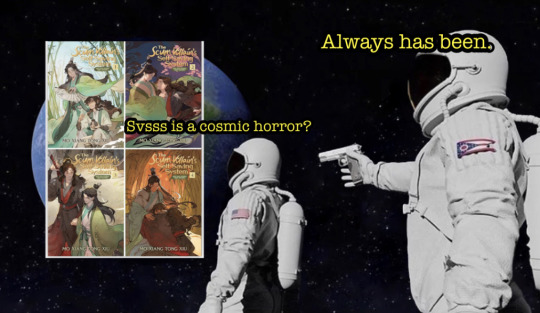
I hate when people write svsss off as “the funny one” when it has some of the best satirical commentary’s I’ve ever seen in a novel. There’s so many layers to scum villain and so many ways to interpret it, it’s everything from a lighthearted romantic comedy to a cosmic horror story and everything in between. There’s so much nuance and depth but people so easily write it off as either “problematic” or “not that serious” and it makes me so angry. Idk justice for scum villain
#i could write an essay on this#I HAVE written an essay on this#idk I feel like I deserves a better rep#svsss is a dumpster fire but it’s my dumpster fire#svsss#ren zha fanpai zijiu xitong#luo binghe#mxtx#shen yuan
432 notes
·
View notes
Text
ok new game - if your current writing project (original or fic or whatever) was published tomorrow, what about it would make booktok denounce you as problematic? rb with answers in the tags
#writing stuff#I’m writing about the third crusade atm so there’s a LOT going on in there#starting with the problem of not utterly denouncing the crusades on the first page and going from there#I also have a lot of unhealthy queer rep#and female characters who want to get married and have kids#so I’m in trouble basically#my other projects include some very unhealthy romantic relationships#and women killing other women#not even in a fun sapphic kinda way just in a murder kinda way
187 notes
·
View notes
Text
Rating: Mature
Warnings: No Archive Warnings Apply
Relationships: Espio the Chameleon/Silver the Hedgehog
Characters: Espio the Chameleon, Silver the Hedgehog, Infinite the jackal (mentioned), Vector the Crocodile (mentioned), Charmy Bee (mentioned), Blaze the Cat (mentioned)
Tags: Slow Burn, Romance, Strangers to lovers, Sailor AU, not pirates just sailor, think of Wind Waker minus Tetra’s ship, injuries, injury description though not graphic, Dark subject matter especially at the beginning, Brief description of corpses but not graphic, animals for food so technically implied animal harm, other characters to be added once they appear, Espio and Silver are 23 and 21 to give their backstories some room to breathe (and fit with the lore better), other characters are aged differently with different age gaps than canon for the same reasons, additional warnings will be told in beginning notes, espio pov, near-death experiences
Summary: Espio is going through the motions of the servant life in the mysterious prison that is the Tower, until the sight of a particular prisoner rekindles a wish to escape. But after eight years in the Tower, breaking out with the stranger in the cell is only the beginning.
#espilver#silver the hedgehog#espio the chameleon#rep writes#Where the Water Narrows#I changed my mind about the title#I had another idea so it works me thinks#silvespio#Silver x Espio#espio x silver
21 notes
·
View notes
Text
I need people to understand how S&P (standards and practices) works in television and how much influence they have over what gets to stay IN an episode of a show and how the big time network execs are the ones holding the purse strings and making final decisions on a show's content, not the writers / showrunners / creatives involved.
So many creators have shared S&P notes over the years of the wild and nonsensical things networks wanted them to omit / change / forbid. Most famously on tumblr, I've seen it so many times, is the notes from Gravity Falls. But here's a post compiling a bunch of particularly bad ones from various networks too. Do you see the things they're asking to be changed / cut ?
Now imagine, anything you want to get into your show and actually air has to get through S&P and the network execs. A lot of creators have had to resort to underhanded methods. A lot of creators have had to relegate things to subtext and innuendo and scenes that are "open to interpretation" instead of explicit in meaning. Things have had to be coded and symbolized. And they're relying on their audience to be good readers, good at media literacy, to notice and get it. This stuff isn't the ramblings of conspiracy theorists, it's the true practices creatives have had to use to be able to tell diverse stories for ages. The Hays Code is pretty well known, it exists because of censorship. It was a way to symbolize certain things and get past censors.
Queercoding, in particular, has been used for ages in both visual media and literature do signal to queer audiences that yes, this character is one of us, but no, we can't be explicit about it because TPTB won't allow it. It's a wink-wink, nudge-nudge to those in the know. It's the deliberate use of certain queer imagery / clothing / mannerisms / phrases / references to other queer media / subtle glances and lingering touches. Things that offer plausible deniability and can be explained away or go unnoticed by straight audiences to get past those network censors. But that queer viewers WILL (hopefully) pick up on.
Because, unfortunately, still to this day, a lot of antiquated network execs don't think queer narratives are profitable. They don't think they'll appeal to general audiences, because that's what matters, whatever appeals to most of the audience demographic so they can keep watching and keep making the network more money. The networks don't care about telling good stories! Most of them are old white cishet business men, not creatives. They don't care about character arcs and what will make fans happy. They don't care about storytelling. What they care about is profit and they're basing their ideas of what's profitable on what they believe is the predominate target demographic, usually white cis heterosexual audiences.
So, imagine a show that started airing in the early 2000s. Imagine a show where the two main characters are based on two characters from a famous Beat Generation novel, where one of the characters is queer! based on a real like bisexual man! The creator is aware of this, most definitely. And sure, it's 2005, there's no way they were thinking of making that explicit about Dean in the text because it just wouldn't fly back then to have a main character be queer. But! it's made subtext. And there are nods to that queerness placed in the text. Things that are open to interpretation. Things that are drenched in metaphor (looking at you 1x06 Skin "I know I'm a freak" "maybe this thing was born human but was different...hated. Until he learned to become someone else.") Things that are blink-and-you-miss-it and left to plausible deniability (things like seemingly spending an hour in the men's bathroom, or always reacting a little vulnerable and awkward when you're clocked instead of laughing it off and making a homophobic joke abt it)
And then, years later there's a ship! It's popular and at first the writers aren't really seriously thinking about it but they'll throw the fans a bone here and there. Then, some writers do get on the destiel train and start actively writing scenes for them that are suggestive. And only a fraction of what they write actually makes it into the text. So many lines left on the cutting room floor: i love past you. i forgive you i love you. i lost cas and it damn near broke me. spread cas's ashes alone. of course i wanted you to stay. if cas were here. -- etc. Everything cut was not cut by the writers! Why would a writer write something to then sabotage their own story and cut it? No, these are things that didn't make it past the network. Somewhere a note was made maybe "too gay" or "don't feed the shippers" or simply "no destiel."
So, "no destiel." That's pretty clearly the message we got from the CW for years. "No destiel. Destiel will alienate our general audience. Two of our main characters being queer? And in a relationship? No way." So what can the pro-destiel creatives involved do, if the network is saying no? What can the writers do if most of their explicit destiel (or queer dean) lines / moments are getting cut? Relegate things to subtext. Make jokes that straight people can wave off but queer people can read into. Make costuming and set design choices that the hardcore fans who are already looking will notice while the general audience and the out-of-touch network execs won't blink and eye at (I'm looking at you Jerry and your lamps and disappearing second nightstands and your gay flamingo bar!)
And then, when the audience asks, "is destiel real? is this proof of destiel?" what can the creatives do but deny? Yes, it hurts, to be told "No no I don't know what you're talking about. There's no destiel in supernatural" a la "there is no war in Ba Sing Se" but! if the network said "no destiel!" and you and your creative team have been working to keep putting destiel in the subtext of the narrative in a way that will get past censors, you can't just go "Yes, actually, all that subtext and symbolism you're picking up, yea it's because destiel is actually in the narrative."
But, there's a BIG difference between actively putting queer themes and subtext into the narrative and then saying it's not there (but it is! and the audience sees it!) versus NOT putting any queer content into the text but SAYING it is there to entice queer fans to continue watching. The latter, is textbook queerbaiting. The former? Is not. The former is the tactics so many creatives have had to use for years, decades, centuries, to get past censorship and signal to those in the know that yea, characters like you are here, they exist in this story.
Were the spn writers perfect? No, absolutely not. And I don't think every instance of queer content was a secret signal. Some stuff, depending on the writer, might've been a period-typical gay joke. These writers are flawed. But it's no secret that there were pro-destiel writers in the writing room throughout the years, and that efforts were made to make it explicitly canon (the market research!)
So no, the writers weren't ever perfect or a homogeneous entity. But they definitely were fighting an uphill battle constantly for 15 yrs against S&P and network execs with antiquated ideas of what's profitable / appealing.
Spn even called out the networks before, on the show, using a silly example of complaints abt the lighting of the show and how dark the early seasons were. Brightening the later seasons wasn't a creative choice, but a network choice. And if the networks can complain abt and change something as trivial as the lighting of a show, they definitely are having a hand in influencing the content of the show, especially queer content.
Even in s15, (seasons fifteen!!!) Misha has said he worried Castiel's confession would not air. In 2020!!! And Jensen recorded that scene on his personal phone! Why? Sure, for the memories. But also, I do not doubt for a second that part of it was for insurance, should the scene mysteriously disappear completely. We've seen the finale script. We've seen the omitted omitted omitted scenes. We all saw how they hacked the confession scene to bits. The weird cuts and close-ups. That's not the writers doing. That's likely not even the editors (willingly). That's orders from on high. All of the fuckery we saw in s15 reeks of network interference. Writers are not trying to sabotage their own stories, believe me.
Anyways, TLDR: Networks have a lot more power than many think and they get final say in what makes it to air. And for years creative teams have had to find ways to get past network censorship if they want "banned" or "unapproved" "unprofitable" "unwanted" content to make it into the show. That means relying on techniques like symbolism, subtext, and queercoding, and then shutting up about it. Denying its there, saying it's all "open to interpretation" all while they continue to put that open to interpretation content into the show. And that's not queerbaiting, as frustrating as it might be for queer audiences to be told that what they're seeing isn't there, it's still not queerbaiting. Queerbaiting is a marketing technique to draw in queer fans by baiting them with the promise of queer content and then having no queer content in said media. But if you are picking up on queer themes / subtext / symbolism / coding that is in front of your face IN the text, that's not queerbaiting. It's there, covertly, for you, because someone higher up didn't want it to be there explicitly or at all.
#long post#LONG-ass post#but it needed to be said!#i'm sorry if you think every creative involved with spn was a braindead asshole but the thing is.#even the most mediocre of writers understands a thing or two abt symbolism and writers working in TV are plagued by S&P#countless writers have talked abt the S&P bullshit and having to tweak and edit down their work to get past censors#it's a reality of writing for television#and the people who understand all this and understand the context of making TV in the early 2000s (to present tbh!) aren't 'delusional'#i'm sorry but it's naive to think that queer stories and queer characters are free to be told even nowadays. it's still a constant battle#times have changed but unfortunately not as much as you'd think#the confession !!!!! the confession still struggled to air and what we got was so obviously hacked down to bits!!!!!!#how can anyone think getting destiel content into the show was ever easy?#how can anyone think the pro-destiel writers weren't constantly having to be careful and underhanded in their writing?#there's a reason queercoding and subtext exist and it's this!!! it's censorship from TPTB#anyways. people much older than me have been talking abt this for ages. younger fans who are used to more open queer rep need to understand#it hasn't always been that easy and even nowadays SO many networks are still not willing to take a risk on queer stories#so creators do what they can#vic.txt
316 notes
·
View notes
Text
they girlbossed Sally Jackson
#pjo#pjo tv#riordanverse#sally jackson#this shall be my non-spoiler only review of the show so far#just watched the first two episodes - they were good!#i might make a post about Percy's char so far cause i am very pleasantly surprised so far with the adhd experience vibes#my compliments to the writing team for the good good disabled character rep in this script#very pleased with almost all the characters and plot so far#my only one i'm iffy on is Sally as mentioned ^ they girlbossed her#like. book sally is most defined by her kindness and perseverance. this sally is just kind of. tough. she's tough. girlboss.#which is not necessarily a bad thing? she's still a fine character she's just different#also only semi-spoiler in my review: Chris is there! Love that Chris is there#he's just there! but i am a rogue demigod enjoyer#so his presence alone is appreciated
239 notes
·
View notes
Note
Wait, what’s going on with Embers???? That fic has been on my read later list since 2021, what’s happened with it???
Brief overview, then I'm likely never touching this topic again, because this is not a Drama Blog:
Context: Embers is a super old AtLA fic that was written during the early fandom days, read widely at the time, and was the origin of the widely-used fanon name of "Wani" for Zuko's ship (kind of by default that it was one of the first popular fics to give his ship a name, I think?), even though most fic writers don't seem to realize it's from there anymore.
"What's Going On": I used to include a link in all my stories to it, because I believe in crediting other writers for borrowed elements, and I was using "Wani" in all my fics. But BOY did I not want to be sending readers that way anymore, so I've adopted a new name for Zuko's ship, and removed all Embers links.
None of the criticisms about Embers itself are new; I'm assuming they date back to when the fic was being written, because this isn't an "it aged badly" thing, this is an "actually yeah this gets worse the longer you think about it and I shouldn't have ignored my bad feelings just because some of the worldbuilding was interesting" thing.
An Incomplete List of Why I Made the Change:
I don't actually like the story that much anymore, and don't want to rec it
I tried to re-read it recently to see if some things were as bad as I remembered and it turns out they were So Much Worse Oh Yikes. More specifically, the treatment of Katara and Aang and their respective cultures has... rather a lot going on. One example: The Fire Nation and Air Nomads are both given multiple backstory elements in an attempt to make the average Fire Nation soldier's participation in the genocide/war in large part the fault of the Avatar and the Air Nomads themselves, and also fully justified from the Fire Nation perspective. And I do mean fully. One of its core tenants is "People from the Fire Nation (and only people from the Fire Nation) who don't follow orders Literally Die, therefore murdering pacifists and babies and continuing the war (and their regularly scheduled war crimes) is the only thing it is physically possible for them to do". I cannot emphasize enough how literal that is.
Also the name "Wani" means "Alligator" and is... objectively a pretty lame name for Zuko's ship? Where's the personality, where's the deeper meaning, where's the resonance with Zuko's themes? @tuktukpodfics initially thought I was calling the ship "Wanyi", and that's what I've switched to, because it is Objectively So Much Better. In their words: “Wànyī (萬一): Literally ‘one in ten thousand,’ ‘perchance.’ Used grammatically in Chinese to mean ‘what if’ or ‘just in case.’ I think a ship called ‘The Perchance’ is perfect for a boy clinging to false hope.”
TL:DR; I don't rec Embers anymore, because I don't actually like the story anymore, and there are things about it that get worse the more I think on them. I've removed links to it and renamed Zuko's ship to "Wanyi" ("The Perchance") because our boy deserves a ship name that reflects his character arc.
#for the record if you ever find something kind of rancid in my fics#do please let me know#EX: I've rewritten scenes to be better Actual Blind Rep for Toph based on blind reader feedback#and I'm debating how hard it would be to ignore/re-write the canon issues of Water Tribe sexism (for the Southern Tribe at the least)#because that is a common complaint I see from the people who's RL cultures the Water Tribes was based on#probably I can do more interesting things with that going forward#in other words justice for Hama and Hahn#at least the show itself made Hama excellently complex#anyways back to doing actual writing#please no follow up questions#though I will say anyone who wants to update their own fics to use Wanyi (or any other name): go for it!#all you need to do is plop your chapters in a word editor and find/replace the ship name! it took about 40 minutes to do literally#all of my fics and I had some other editing to do besides! it'll be even quicker for you!#let's sink the Wani#avatar the last airbender#atla#Zuko
458 notes
·
View notes
Text

Bluepoch gave us the gift of barely-subtext tragic sapphic-centric media do NOT throw that away.
Context regarding PJSK and Undertale under cut.



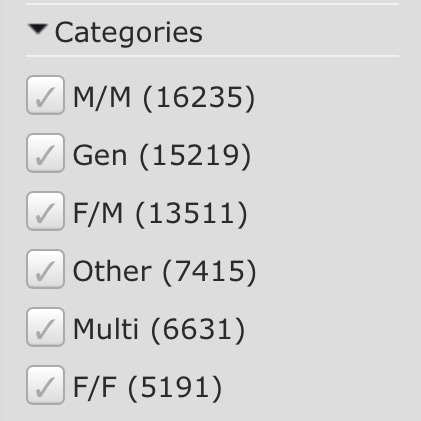
Project Sekai cast is dominated by female characters but mlm is more popular, meanwhile Undertale has canon wlw rep and oh my god they’re at the bottom. I have nothing against these fandoms or media (I’m literally currently/was in them) but yeah. I just HOPE r99 doesn’t end up in a similar state.
#mochagaming#if r99 ever gets even more popular and people somehow manage to out-yaoi the yuri i may actually buy a gun#‘write more yuri then’ I AM <3 AND LETS KEEP WRITING YURI R99 NATION#this is an irrational fear btw#especially since the fandoms i previously in kept fixating on the men in women-centric media#which is not bad#good for them#but its alienating for me LOL#thankfully rn r99 fandom is still diligent woman appreciators so thanks guys#keep it up#I HAVE NOTHING AGAINST MEN OR MLM#I JUST REALLY NEED THAT SAPPHIC SPOTLIGHT#LET THIS DESPERATE LESBIAN DREAM THAT HER FAV GAME STAYS YURIFUL#(because fandom activity genuinely affects the game itself so…)#reverse 1999#I am not trying to discourage any form of fandom content#But if I see someone complain about ‘lack of men’ in this game I… I genuinely dont know??? what to say???#we dont even have enough lesbian rep. it is always cast aside.#it should be prioritized (by bluepoch) i think#like to charge reblog to cast
125 notes
·
View notes
Text
yes yes robin or eddie teaching steve about bisexuality that’s all good but consider!! steve talking to mike and explaining to him that sometimes people just like boys and girls, and that it’s okay. steve coming out to mike, telling him that he’s, like, kinda sorta dating eddie munson, and that that doesn’t mean he never loved nancy.
and then mike — prickly, ten walls around his heart, snarky comment on his tongue even when no one’s around, suppressed, confused, kinda scared, super in love with will — wheeler has a first, very tentative coming out. to steve harrington, of all people. and maybe that’s okay.
update: theres a fic now
#listen i’m just. i have thoughts. THOUGHTS i tell ya!!!#let me just have dinner and a shower and then i’ll write this!!! happy pride month etc etc i just. i need mike to have healthy bisexual rep#and steve’s like ‘yeah man it sucks ass sometimes but it’s also pretty neat. and will called you the heart of your group.#so what if that heart has room for boys and girls dude. just means you have a big fuckin heart.’#stranger things#this ain’t even a post i’m just hyping myself up for this also otherwise i’ll forget
480 notes
·
View notes